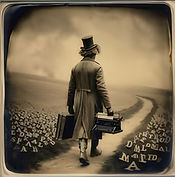Artists Interview - The Three of Them
The road is long and never straight. Tell your origin stories: background, first years, school days?
Amanda: Growing up in East Texas, I was surrounded by women that worked with their hands—shelling peas, crocheting, painting, knitting, sewing, cooking. I took it for granted but I found when I began making art as an adult I had absorbed much from them. I wanted to be a teacher, then I took a bookkeeping class and I became a CPA. I began photographing and working in the darkroom in my early forties. I was hooked. However, just making an image was not enough for me, I began working with pinhole cameras and eventually with encaustic on the images. I have hand colored on images, experimented with cyanotype, built tin boxes as frames, and now I am applying gold leaf to my composited images. It has been a wonderful, challenging, very fulfilling time in my life. Oddly, I do enjoy bookkeeping too.
Kevin: Without the CPA there would be no gallery. I have been told I was always a bit odd. My best friend growing up was wildly creative. We were always doing something out of the ordinary for our age. I was an artist but didn’t absolutely accept it until I was in my early thirties. I began my career as a landscape designer and contractor. I studied art and architecture in school, going back again at thirty. As a result of my ADD I have designed landscapes, designed and built houses, designed and built cabinets and furniture, and painted. However, I always thought I would be a writer, going back to the fourth grade. (Made me tired just writing that.) My photography journey started in 1980 when my roommate and I set up a darkroom in our kitchen. But I didn’t really drill down into the art of it until I met Amanda thirteen years ago. The best thing that ever happened to me.
Franklin: Hard to follow show-offs. Hell, I’m just lucky to have three hot meals a day. If that librarian hadn't found me bawling
on the steps of the library I might have been raised by feral cats. Nothing against cats but hard to imagine writing in feline. That Librarian was a sweetheart. She had me reading Steinbeck and Hemingway and Wolfe by the time I was four. Writing just always came natural to me. I was making ice cream money at eight writing obituaries for the local paper. I met Kevin in a Mexican restaurant in Austin. He was nursing a hangover with a plate of beautiful, greasy enchiladas and a tall horchata with rum. When he found out I could write he offered me a horchata and rum if I would write something and get him out of a jam. We’ve been inseparable ever since. I would rather not shower with him.

Kevin and Amanda

Frank
Any surprises, big decisions, turning points early on?
Amanda: Finding photography changed my life. A while back, looking at a box of my father’s old photographs, I realized that he had a great eye. He knew where to place the camera. He could have been a very good photographer. Discovering this has given me a bit of a boost, as if maybe I was meant to pick up a camera. The life-changing, big decision I made was opening the gallery fifteen years ago. It never caused me any discomfort. It always seemed right. It has been a wonderful ride. Kevin showing up took the gallery to places it wouldn’t have gone if it had been just me.
< Click the buttons to turn interview pages